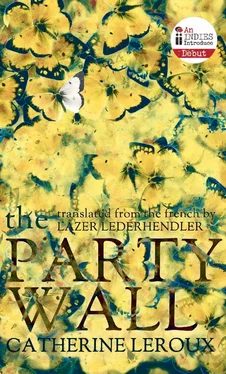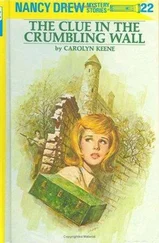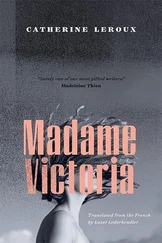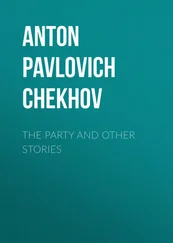Édouard spent two days with the truck driver. He was not like the others; to start with, he was not fat. After only a few years on the road, most of his fellow truckers had put on excess weight and as a result were beset by a host of problems and illnesses that would eventually finish them off. But Joe had stayed slim and Édouard could not say if he was thirty or fifty years old. His moustache — so blond it was almost white — did not help. Although he did not seem to be especially conceited, he had stuck a photograph of himself on the rear-view mirror and never stepped off the truck without flicking his thumb over the picture.
Joe was a quiet man. He was heading to Oklahoma over the arrow-straight roads that blazed across the plains, but he never spoke the state’s name, preferring the term “Dust Bowl” as if he’d been born in 1929 into a family of destitute farmers. Most truckers like to talk about the places they had grown up in; this one said very little about his hometown. He smoked cigarillos — their cherry aroma streaming out the half-open window — and scrupulously avoided religious radio stations as well as country music channels, favouring instead the rare classical music shows. He never used his CB radio to speak to the other truckers and did not wave to them when they passed. Whenever he drove past a dead deer or coyote on the side of the road, he would cross himself.
The one night Édouard spent in Joe’s company, Joe insisted on giving up his bunk and chose to sleep under the stars. Young and incorrigible, Édouard used the opportunity to invite the truck stop waitress to join him in the cab when her shift ended. She was barely four feet eleven and had breasts like birthday balloons. When they slipped outside in the wee hours for one last kiss, Édouard saw Joe lying with his arms spread wide on the roof of the trailer, crucified between sleeplessness and dreams, between the Milky Way and the blacktop.
They reached Oklahoma in the late afternoon. Joe then left the interstate and took a backroad riddled with potholes. Édouard, who was going nowhere in particular, silently let himself be transported. Behind them, the trailer clanged like a cracked cymbal. It sounded as if the truck was empty. Joe finally stopped on the outskirts of a town, near a cemetery. Without saying a word, he alighted, walked over to the graves, where he quickly found the one he was searching for and knelt down in front of it.
Édouard waited two hours for the trucker to get up and take his seat again behind the wheel; it was then he realized that Joe had reached his destination. Determined to head out again in the first car that pulled over, Édouard stepped closer to say good-bye to Joe. On the grave where Joe was immersed in prayer were a few wildflowers, several stones of various shapes and colours arranged in a small mound, and a photograph that Joe apparently had just placed there. In the picture were two Joes, the first with his arm draped across the shoulders of the second Joe, who was also wearing a jean jacket and holding a bottle of beer. Only one of them was wearing a Chiefs cap.
Édouard cleared his throat to draw the trucker’s attention. To no avail. The traveller timidly uttered some simple words of thanks but was cut short by the trucker’s arm, which abruptly shot up to hush the voice that was disrupting his meditation.
Joe did not turn around for another hour and remained completely silent, as if petrified beside the grave of his double. A car stopped and took Édouard eastward, and the twins remained alone in their intangible communion. Now, every time Édouard recalls that episode, he is stricken with shame.
No matter how often Madeleine repeats to herself she is two, the news has left her prostrate with a feeling of overpowering solitude. She can’t help harking back to a period of her childhood when she would spend her days playing in a closet with faceless figurines. She might have shared all those terrible, gloomy hours giggling and exchanging secrets with another little girl. “Maybe that is what allowed us to survive,” she tells herself by way of encouragement. “If we had not merged, we may not have had the strength.”
The heat wave has grown too heavy for human restlessness. Madeleine succumbs to it and scans the sky desperately hoping to glimpse a cloud or a passing iceberg. Inside the house muffled by the heat, the cat, dragging an invisible weight, laboriously grooms itself, while Édouard rests. Day by day his health is deteriorating despite the dialysis and the host of drugs he swallows each morning. His reaction on learning of Madeleine’s chimeric nature was rather indifferent. Whereas Joanna rushed to wrap her arms around Madeleine and Yun plunged into some books to find out more about the phenomenon, Édouard simply nodded:
“I’m not all that surprised. It explains why you’re constantly talking to yourself.”
Madeleine bit her thumb. A few days later she found a drawing on the living room coffee table. A hybrid woman, part shark, part doe.
The small hours of the morning find her sitting at the kitchen table. She catches herself wishing Micha were there; he would have considered the situation with the same equanimity he would display when faced with most of the vagaries and dramas of the world around him. His coolness sometimes annoyed Madeleine, but it had a soothing effect whenever panic came scratching at the door at about three in the morning. One night Joanna comes downstairs as if she has heard her host calling. She tiptoes in and sits down next to Madeleine.
“Insomnia or an early hike?” Madeleine inquires.
“A bit of both,” her guest answers slowly, with her typical stress on the consonants. “Can’t get back to sleep, so I’m going out.”
Madeleine collects the crumbs of the last meal between her fingers and shapes them into a small nest bounded by one of the squares on the check tablecloth.
“And you? How are you doing?” Joanna asks.
Madeleine smiles, adding a few specks of bread to the mound.
“All right.”
“Can I ask you something?”
“Yes.”
“Do you remember?”
“What?”
“When you were separate?”
Madeleine shuts her eyes to better concentrate and tries to discern what she has striven so hard to imagine that it has already become a kind of memory: the pink of the uterine world, the aquatic motion, an amoebaean form dancing nearby, brushing her in the amniotic wave.
“No, we were too small.”
“Pity. Just imagine if you could recall the sensation of merging with another human being. In a way, you experienced in the first moments of your existence what everyone spends their whole life desiring.”
Madeleine sets down her cup with the camomile dregs floating at the bottom, stands up and, leaning over Joanna, kisses her on the cheek. Outside, the sun is coming up. The animals throughout the peninsula are chomping at the bit.
In the village the parade of compassion has resumed in the aisles of the grocery store. People stop to ask after Édouard in hopes of leaving with some clarifications, anecdotes, or an exclusive insight into the chimera.
“Do you eat more than a normal person?”
“When you’re injured, does it hurt in only half of your body?”
“Do you believe you have two souls?”
Madeleine makes an effort to be patient, answers the strange questions as best she can and sidesteps the stupid ones. What takes place at the lighthouse museum’s board meeting is hardly any better. In an attempt to forestall awkward questions from her colleagues, Madeleine picks up a report as bulky as a loaf of bread and tries to start her presentation as quickly as possible, but she has trouble breathing under the inquisitive eyes of her audience. The silence grows heavy; Madeleine is paralyzed by the many eyes fixed on her, by these colleagues who are not interested anymore in the number of visitors or the box-office takings at the lighthouse, but rather in the little museum of horrors that she incarnates. She looks at their notepads covered with doodles, their drained pens, the requisite cups of acidic coffee left hovering in front of their faces so they can scrutinize her on the sly while she parses the attendance graphs, until she finally breaks off.
Читать дальше











